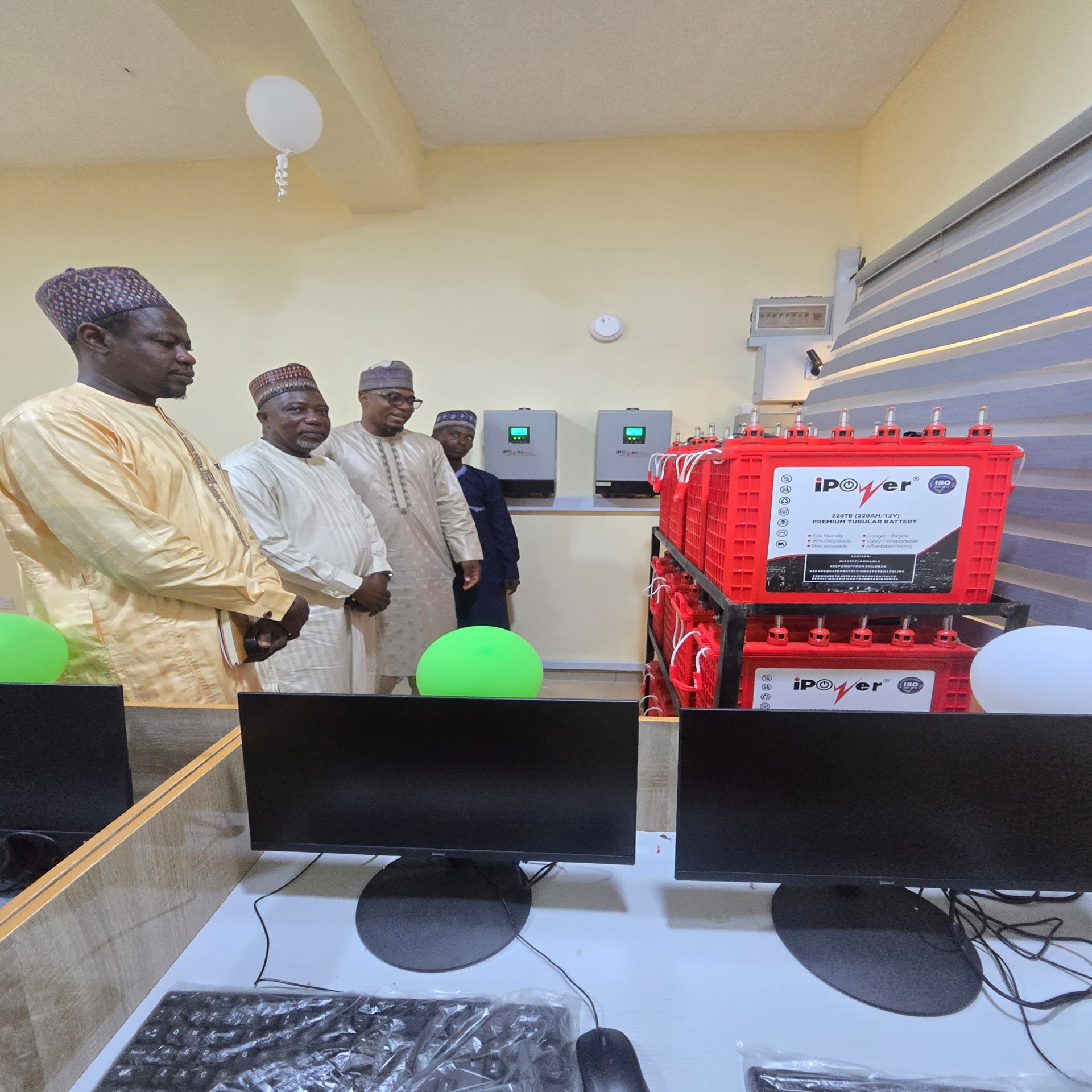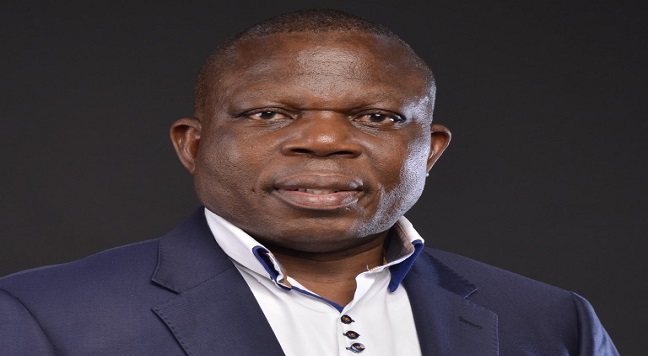News
Zinox Chairman Leo Stan Ekeh Donates State-of-the-Art Tech Experience Centre to Federal University Birnin Kebbi

Federal University Birnin Kebbi (FUB) received a significant boost in its quest to produce globally competitive graduates, following the donation of a multimillion-naira Tech Experience Centre by the Leo Stan Ekeh Foundation (LSEF).

The facility, donated by Mr. Leo Stan Ekeh, Chairman of Zinox Group and Founder of LSEF, was commissioned on his behalf by the President of the Nigeria Computer Society (NCS), Dr. Muhammad Sirajo Aliyu, FNCS.
The centre is equipped with the latest Zinox computers, powered by the iPower renewable energy suite, which features high-performance solar panels and certified lithium batteries. It is also connected to a 24-hour, non-disruptive satellite internet service powered by Starlink, a service that the LSEF has committed to funding for the next five years.
According to Mr. Ekeh, the Tech Experience Centre is dedicated to the use of students and knowledge workers at FUB, with the aim of equipping them with the digital skills and resources required to compete with their peers globally and contribute meaningfully to Nigeria’s economic development.
This centre is one of several cutting-edge technology hubs donated by the Leo Stan Ekeh Foundation to tertiary institutions across Nigeria. It supports the Federal Government’s vision to upgrade the nation’s higher institutions to world-class standards.
For over 25 years, Mr. Ekeh and the Zinox Group have consistently invested in promoting digital education by donating tech laboratories and innovation hubs. In recent years, the Foundation has delivered and equipped centres at St. Augustine University, Lagos, and Imo State University and refurbished older facilities it had donated in the past. According to Mr. Ekeh, the next phase will see the Foundation extend similar interventions to secondary schools across the country.
He called on politicians, government agencies, and wealthy Nigerians to intentionally invest in the nation’s education sector, stressing that a well-educated populace is the Foundation for national development.
Mr. Ekeh expressed his appreciation to the Chairman of the University Council, the council members, Vice Chancellor Professor Muhammad Zaiyan Umar, members of the University Management, staff, and students of FUB, as well as the Honourable Minister of Education, Dr. Tunji Alausa, for their support in accommodating the LSEF’s vision.
Speaking on behalf of the university, Professor Muhammad Zaiyan Umar, Vice Chancellor of FUB, expressed deep appreciation to Mr. Ekeh and the LSEF for the generous donation.
“This Tech Experience Centre will make a remarkable difference in the academic and research output of our students and staff. We are grateful for Mr. Ekeh’s vision, generosity, and long-standing contributions to this institution and to digital education in Nigeria. This facility is more than a building with computers; it is an investment in the future of our graduates and the growth of our nation.”
Speaking on the sidelines of the commissioning, Mr. Chimezie Orisakwe, Head of Corporate Communications for the Zinox Group, highlighted Mr. Ekeh’s sustained promotion of digital learning across Nigeria — from interventions in the media sector to landmark projects with the media, Independent National Electoral Commission (INEC), the National Population Commission (NPC), and others.
He also highlighted Mr. Ekeh’s reflection on the current state of Nigeria’s education sector, warning that many institutions, both public and private, face severe funding deficits. This, he noted, raises the risk of closures, which would deprive graduates of the enduring legacy of their alma maters.
To address these challenges, the Zinox Chairman proposed that the Federal Government adopt a college system and reclassify existing universities. He recommended granting approvals for specialized professional colleges affiliated with reputable universities, similar to the Lagos University Teaching Hospital (LUTH) model with the University of Lagos.
Ekeh emphasized that the quality of an institution’s academic content now matters more than its physical size. Those passionate about establishing tertiary institutions must be focused on their core mission, be willing to invest adequately, and possess the mental and financial capacity to sustain standards.
He further urged that educational institutions be regulated even more stringently than banks, given their central role in producing the human capital that drives both the public and private sectors.
“Educational institutions are not limited liability companies that can be liquidated at will. Their true profit is not in short-term returns but in the quality of graduates they produce, men and women who can lead this nation and give back to the institutions that shaped them,” Ekeh stated.
The donation to FUB is the latest in a long list of interventions by the Zinox Group to support Nigeria’s technological advancement. Through the Leo Stan Ekeh Foundation, the Group has also funded thousands of scholarships, donated modern digital learning facilities nationwide, extended non-interest loans to budding entrepreneurs, and supported churches, hospitals, and humanitarian causes.
News
New Horizons Invests N50m to Empower Almajiris with Skills

New Horizons Nigeria has launched a N50 million initiative aimed at transforming 21 Almajiri children into skilled computer technicians within 90 days, to tackle youth unemployment and harness human potential.

The Almajiri-to-Tech programme, officially launched in Abuja on Monday, provides participants with full training, meals, clothing, tools, and logistics support, all fully funded.
Speaking at the launch, the Chief Executive Officer of New Horizons, Tim Akano, said the programme represents a new journey in the history of Nigeria by restoring the original purpose of the Almajiri system, which he described as “children sent out to seek knowledge.”
“The word Almajiri comes from an Arabic term meaning emigrant and seeker of knowledge. Historically, children were sent to learn morals, responsibility, and skills to add value to society,” Akano said.
He added that the disruption of this system during colonial times forced many children onto the streets, a challenge that persists today.
Akano highlighted the urgency of addressing the Almajiri issue, noting that there are an estimated 15 million Almajiris in the country, with a population growth rate of around three per cent annually.
“If we do not solve this problem as a country, we are sitting on a time bomb,” he warned.
According to him, the programme focuses on hands-on technical skills rather than theory. Trainees will learn to repair mobile phones, laptops, televisions, radios, standing fans, and other electronic devices, as well as build inverter batteries using recycled electronic waste.
“We are not teaching theory. We are teaching practical skills you can use to earn a living,” Akano said, stressing that the programme will not interfere with the participants’ Quranic education.
“We are still going to allow you, within the period of learning. Your learning computer here is not stopping your Quranic education.
“You still have time within our space here. Whenever you want to go and pray, you can pray, then come back to class,” the CEO stressed.
He added that participants will also receive daily meals, water, T-shirts identifying them as technicians-in-training, and access to all necessary tools and equipment throughout the 90-day programme.
Akano said the initiative is part of a larger mission by New Horizons Nigeria, which has spent the past 21 years training about 100,000 Nigerians annually in IT and related skills.
He said the new programme aims to “take human genius off the streets and convert it into human capital, enabling these youths to contribute meaningfully to the economy.”
He added that equipping Almajiris with skills could add 15 million people to Nigeria’s workforce and potentially increase the country’s GDP by as much as $20 billion, stressing that productivity depends on practical skills and opportunity.
“Everything that can be taught can be learned. If someone can memorize the Quran cover to cover, there is nothing that cannot be done. What they lack is information, opportunity, and infrastructure, and we are providing all of that,” Akano said.
Akano also stressed that the initiative is designed to inspire other organizations and government agencies to replicate similar programmes across the country.
“This is not just about 21 children; it is about showing Nigeria what is possible when resources meet intention and planning.
“If we succeed in empowering these Almajiris, we demonstrate that the country can turn social challenges into economic opportunities. It’s a blueprint for Nigeria’s future,” he said, noting that the initiative combines social reform, technical education, and economic empowerment.
Also speaking, one of the trainees, Fatima Umar, appreciated the organisers and promised to maximise the opportunity.
“We’ll make you proud of us. We have nothing to say here but to thank and appreciate you. May Almighty Allah continue to guide and protect you,” Umar said.
News
IMF Upgrades Nigeria’s 2026 Growth Projection to 4.4%

International Monetary Fund has upgraded Nigeria’s 2026 economic growth projection to 4.4 per cent, reflecting improved macroeconomic stability and sustained reforms.

IMF
The January 2026 World Economic Outlook Update forecasts Nigeria’s growth trajectory at 4.1 per cent in 2024, 4.2 per cent in 2025, and 4.4 per cent in 2026—a 0.2 percentage point increase from the October 2025 estimate.
This aligns with sub-Saharan Africa’s projected 4.6 per cent expansion in 2026 and 2027, driven by regional stabilisation efforts.
Globally, the IMF anticipates 3.3 per cent growth amid resilient conditions tempered by trade policy shifts and technology investments. For Nigeria, declining energy prices—expected to fall seven per cent due to weak demand—pose risks, though OPEC+ coordination and China’s stockpiling provide support.
Despite the optimism, downside risks persist from Middle East and Ukraine tensions, protectionism, high debt, and fiscal deficits. The Fund recommends rebuilding fiscal buffers, ensuring central bank independence, and limiting temporary fiscal measures to maintain stability.
Nigeria’s success hinges on consistent reforms and resilience against domestic and global shocks, the IMF concluded.
News
Nigeria’s Crude Output Falls to 1.486mbpd in November – OPEC

Organisation of Petroleum Exporting Countries (OPEC) reports that Nigeria’s crude oil production, excluding condensate, dropped by 0.7 per cent to 1.486 million barrels per day (mbpd) in November 2025 from 1.496 mbpd in October.

OPEC
The figure, drawn from secondary sources in OPEC’s December 2025 Monthly Oil Market Report, fell short of Nigeria’s 1.5 mbpd quota. Direct communication data showed output at 1.436 mbpd, up from October’s 1.401 mbpd, but still below target.
Nigeria produces around 196,028 bpd of condensate, excluded from quota calculations per Nigerian Upstream Petroleum Regulatory Commission figures. Year-on-year, November’s output marked a slight gain over 1.417 mbpd in November 2024.
Expert Cites Insecurity, Governance Gaps
Petroleum economics expert Wumi Iledare described the quota miss as unsurprising, blaming persistent insecurity, an ageing oil basin lacking new finds, and unoffered hydrocarbon blocks. Governance shortcomings and policy uncertainty further erode investor confidence, he noted.
Selective implementation of the Petroleum Industry Act worsens the situation, with Nigeria needing a single authoritative leader for the sector rather than multiple proxies, Mr Iledare stressed. The country has struggled to consistently hit OPEC targets for years.

 E-Financial2 days ago
E-Financial2 days agoHere Are Nigerian Banks That Have Secured Their Licences

 Telecom2 days ago
Telecom2 days agoMTN CEO Toriola Hails Nigeria’s Telecom Transformation at MIPAD

 E-Financial2 days ago
E-Financial2 days agoZenith Bank Top Nigerian Bank Pick Ahead of GTCO, AccessCorp

 News2 days ago
News2 days agoICPC Charges Ozekhome with Forgery, Corruption Over London Property

 E-Financial2 days ago
E-Financial2 days agoNigeria Processed $92.1Bn Crypto Transactions in 12 Months — PwC

 E-Financial2 days ago
E-Financial2 days agoHow Crypto Criminals Stole $700m from People – often Using Age-Old Tricks

 Telecom2 days ago
Telecom2 days agoLebara Launches Agent Registration Portal

 E-Business2 days ago
E-Business2 days agoElon Musk Seeks $134Bn from OpenAI, Microsoft for ‘Wrongful Gains’


























